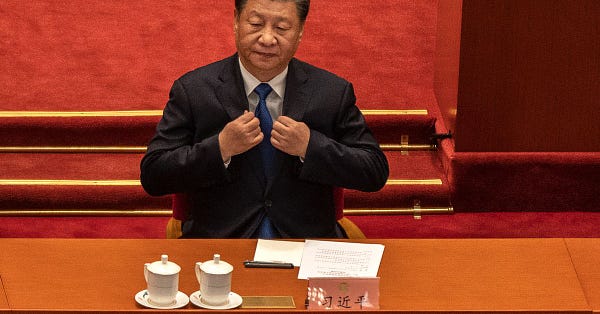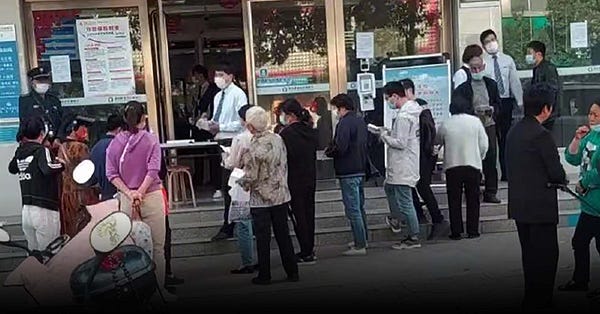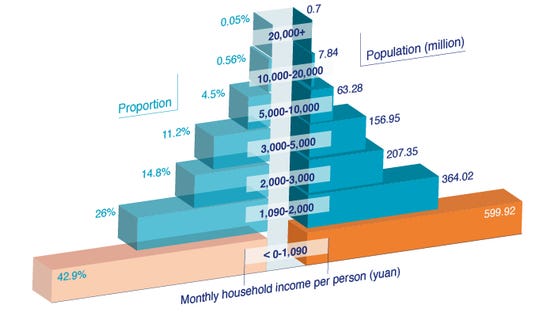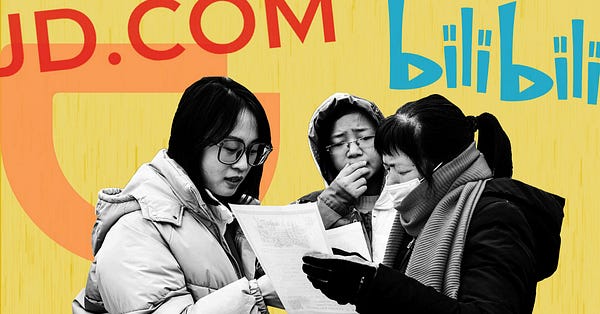Welcome to the 119th edition of Trade War.
Xi Jinping moves China closer to Russia in Putin call and St. Petersburg address. Consumption languishes dragging on the Chinese economy. Budget deficit soars and unemployment becomes a critical challenge.
Health code app used against Chinese trying to withdraw cash from strapped banks. Beijing makes life tougher for international financial institutions. And foreign corporations face imminent supply chain crisis with the Uyghur Forced Labor Protection Act.
And a special bonus section featuring this newsletter author’s thoughts on why Xi is tying China’s fate ever closer to Russia.
Xi: China supports Russia’s “sovereignty and security”
Xi Jinping has given the most direct backing to Putin since Russia’s invasion of Ukraine, reports Politico's Stuart Lau.
Speaking over the phone with Russia’s president on Wednesday, Xi said Beijing would support Moscow’s “sovereignty and security” and “core interests” with the aim of achieving “closer strategic cooperation.”
“From this year, facing global turbulence and transformations, Sino-Russian relations have maintained a good momentum for development,” Xi said. “The economic and trade cooperation between the two countries is progressing smoothly.”
“The Chinese readout also emphasized Putin’s support for China on Taiwan, as well as on Hong Kong and Xinjiang, home to the country’s Uyghur Muslim minority,” reports Politico.


Behavior, rhetoric & actions show not neutral
"To put it bluntly, we are concerned about China’s alignment with Russia. We have noted statements from the PRC claiming that China is neutral, but its behavior, its rhetoric, its actions suggest that it is anything but,” says U.S. State Department spokesman Ned Price.


‘Opposition to the established world order’
“This Wednesday, Xi and Putin again stressed their mutual support; a long-standing pattern. Together with [analyst Vincent Brussee] we analyzed the last 30 years of joint statements, using textual & semantic network analysis software. The data shows a drastic shift under Xi,” writes Roderick Kepperputz, a senior analyst at Merics, in a tweet thread.
“Under Xi, three particular trends emerged: The bilateral relationship turned global with a geopolitical outlook. The relationship became defined by revisionism and opposition to the established world order. Both are trying to shape geopolitical frontiers.”

Xi gives speech at St. Petersburg forum
As expected, Xi also gave a video address on Friday at the St. Petersburg International Economic Forum. Here is the official readout of Xi’s speech, from China’s foreign ministry, which was less “pro-Russian” than Xi’s actual speech, tweets Carnegie Endowment junior fellow Jacob Feldgoise.

China consumption continues to languish
While industrial production and fixed asset investment rose in May, consumers continued sitting on the sidelines, reports Bloomberg News
Industrial production was up 0.7 percent from a year ago in May while investment grew 6.2 percent in the first five months, according to the National Bureau of Statistics. Retail sales last month however were down by 6.2 percent.
Meanwhile, the property sector continued to suffer, with home sales down 41.7 percent and investment falling 7.8 percent in May from a year earlier.
“Instead of spending, consumers are rapidly adding to their savings, which grew by 7.86 trillion yuan ($1.2 trillion) in the first five months of the year, the most for the period since data began in 2005,” reports the financial news service citing figures from the People’s Bank of China.
“We anticipate a recovery in the second half of this year as policy stimulus takes effect,” wrote Tommy Wu, lead China economist at Oxford Economics. However, “it will be difficult for household consumption to recover strongly. Consumer sentiment is unlikely to turn sanguine as ‘dynamic zero Covid’ strategy remains in place despite the fine-tuning that we have seen so far.”
“Beijing’s stimulus has largely targeted businesses, with limited relief for consumers facing job losses and sliding incomes. The government last month rolled out a package of policies, including more tax breaks and loans for infrastructure projects,” reports Bloomberg.
Meanwhile, some economists continue to question the official numbers, notes another Bloomberg article. “Even the most charitable analysts accept that the National Bureau of Statistics smooths the GDP data by understating weakness during downturns,” according to Mark Williams at Capital Economics. “We already saw signs in the first quarter data that the full extent of weakness in the service sector was not reflected in the GDP figures.”

Revising down Q2 to 0% growth
Even as lockdowns ease in Shanghai and other cities, China’s economic outlook looks ever worse, writes MacroPolo’s Houze Song, who has revised his second-quarter growth forecast to roughly zero percent.
“With President Xi Jinping strongly and publicly endorsing the zero Covid strategy, that has become the lodestar for local officials who are hitching their political prospects to executing such a strategy. Consequently, what was once a fixation on the “GDP target” has turned into a preoccupation on meeting the “zero Covid” goal for local cadres,” Song writes.
Faced with millions of unemployed college students and migrant workers, which could “metastasize into social stability issues,” Beijing will focus on “stability maintenance” before the fall party congress, writes Song.
“The preoccupation with firefighting means that Beijing will have to kick the can down the road on handling the economic fallout and addressing long-term public health challenges.”


Budget deficit hits record on Covid costs, falling revenues
China’s broad budget deficit grew by almost a trillion yuan in the first five months, its highest on record, reports Bloomberg News.
While the government took in a total of 10.9 trillion yuan in revenues from January to May, that was less than the 13.8 trillion yuan spent, leaving China with a deficit of 2.9 trillion yuan; that compares to a small surplus over the same period last year and is about 43 percent bigger than in 2020, according to Bloomberg calculations.
While revenues have fallen as Beijing has reduced taxes to support businesses during the pandemic and the the weak real estate market has weighed on government land sale proceeds, costs have jumped to pay for lockdowns and healthcare as well as for new stimulus.
“The drop in revenue just as more spending is needed will force local authorities to either boost their already heavy debt burden or accept weaker economic growth,” reports the financial news service.
“Since Beijing is less willing to expand central-government debt, it will probably also end up tolerating some further increase in hidden local debt” to pay for infrastructure spending, according to Gavekal Dragonomics analyst Wei He. “This will make the long-term campaign to control local debt harder to manage but that is not the major concern for policymakers at the moment,” reports Bloomberg in a separate article.


Youth joblessness in China reaches new high
Joblessness amongst Chinese youth has reached a new high, reports the Wall Street Journal’s Stella Yifan Xie.
Even as the overall jobless rate fell slightly from 6.1 percent in April to 5.9 percent in May, unemployment for youth reached 18.4 percent last month, the highest since before the pandemic, and far above Europe and the U.S.
And with a record 10.7 million university graduates expected this year, the youth jobless rate could reach 23 percent in July and August, BofA Securities economists said in a recent report.
“Rising stress in the labor market reflects both short-term shocks from Beijing’s strict zero-Covid policy as well as the residual impact from policy makers’ clampdown on the property, internet and education sectors,” some of the “most coveted industries for China’s young elites,” writes Xie.
Those who work under “flexible terms,” which includes delivery workers and those in construction, now number more than 200 million, according to China’s National Bureau of Statistics. This group, which includes the majority of migrant workers, is most vulnerable in a weak economy.

But still better than Portugal, Spain, and Greece
“I'm interested in how China's 18.4 percent youth unemployment rate compares to Europe. It's better than countries like Portugal, Spain, Sweden and Greece. Young people are struggling to find jobs all over,” tweets Bloomberg’s Sofia Horta e Costa.


Bailian or ‘let it rot’
Along with Covid lockdowns, Beijing’s crackdown on tech companies is contributing to rising youth unemployment, report the Financial Times’ Ryan McMorrow and Nian Liu.
“Over the past year, China’s once overworked but well-compensated tech workers have seen an erosion of office perks, job cuts, headcount freezes and stalling or falling pay,” reports the financial paper.
After the buzzword tangping or “lying flat” became popular last year to describe opting out of the rat race, now the phrase bailan, roughly translated as “let it rot,” is being used by Chinese youth to describe giving up on fruitless job searches.
Health codes block bank withdrawals
People who wanted to withdraw money from struggling banks in Zhengzhou, Henan discovered their health codes had been turned red, preventing them from using transportation, public services, and even entering the banks, reports Sixth Tone’s Wu Peiyue.
“Thousands of depositors have attempted to withdraw money in person from at least four of Henan’s regional banks with tens of billions of yuan in frozen deposits since April. The move came after Sun Zhenfu, a shareholder of one of the banks, fled following “serious financial crimes” in March, according to media reports,” writes Wu.
“At least 12 depositors Sixth Tone spoke with said their health code turned red when they scanned city-specific QR codes at railway stations, hotels, and other venues that required them,” reports Sixth Tone. “China tracks residents’ locations with national and local health apps as part of its COVID control measures, which limit mobility when codes turn yellow or red.”
“This is using the country’s epidemic prevention policy to prevent the people from seeking justice for themselves,” depositor Wang Jin told Sixth Tone. “Our family’s 420,000 yuan is now frozen, almost all of our savings. I need the money urgently, my parents need medicine, my two children need to go to school, and the family has a big financial burden.”


Foreign banks: don’t overpay execs
Banks including Credit Suisse, Goldman Sachs, and UBS have been warned by Chinese regulators not to pay too high salaries to their top executives, one more example of how Beijing is making life tough for foreign financial institutions, reports Bloomberg News Cathy Chan.
“Don’t reward your top people too lavishly, Chinese regulators warned the banks this year in meetings in Shanghai and Beijing, or you might run afoul of the Communist Party,” writes Chan, citing people familiar with the matter.
While most banks publicly continue to voice optimism about business in China, privately they are expressing worries. “Questions about pay are but one worry (among other things, regulators have pressed banks to reduce cash compensation and extend deferred bonuses to three years or more, people familiar with the meetings say). Other concerns involve licenses, recruiting, data security and more,” reports the financial news service.
“Overriding everything is Xi’s campaign to combat what the Communist Party considers undesirable economic and social elements. Xi wants to rein hyper-rich entrepreneurs, narrow the country’s stubborn wealth gap and promote “common prosperity,”” writes Chan.
Meanwhile, tensions between the U.S. and China have also made business difficult, including by holding up new licenses for banks.
“Wall Street banks really need to ask themselves now, why do I want to be in China?” Hong Kong University of Science & Technology professor Veronique Lafon-Vinais said to Bloomberg. “Are they truly profitable, what is the true return on capital for their China business?”

Looming supply chain crisis
American multinationals are facing an imminent supply chain crisis, when a new law takes effect on June 21st, write Fortune’s Yvonne Lau and Grady McGregor.
The new law, the Uyghur Forced Labor Prevention Act, requires all companies prove their goods from Xinjiang were not made with forced labor.
"Companies thought they could simply place responsibility on to their suppliers," says Laura Murphy, professor of human rights and contemporary slavery at the Helena Kennedy Centre for International Justice at Sheffield Hallam University. "The [new law] calls their bluff. It requires companies to know where their goods are made down to the raw materials and verify it."
Complicating matters is China’s anti-foreign sanctions law, passed last year, which “bars Chinese and foreign individuals and organizations from helping enforce measures that Beijing says are discriminatory against Chinese entities," write Lau and McGregor.
"The law encourages Chinese suppliers to scuttle attempts by multinationals to meet the U.S.'s new legislation, says Dexter Roberts, senior fellow at the Atlantic Council's Asia Security Initiative and author of The Myth of Chinese Capitalism," reports Fortune.


******************************
Xi ties political future to Russia
My thoughts on how China views Russia's invasion of Ukraine and why Xi is tying his country's political future to an ever closer relationship with Moscow - speaking to Rodrigo Craveiro of Brazil’s Correio Braziliense (Portuguese):
Q: What does Xi Jinping’s latest call with Putin tell us about Beijing’s stance on the Russian invasion of Ukraine?
DR: While Xi Jinping continues to regularly talk to Putin - this is his second call since the invasion of Ukraine - he has yet to ever communicate with Ukraine's president Volodymyr Zelensky. Referring to the "legitimacy" of Russia's security concerns during his call with Putin, Xi once again has made it clear that China will do nothing to pressure Russia over its invasion of Ukraine, and indeed continues to stand out amongst countries for the high level of support it offers Russia.
Q: What explains such tight cooperation between China and Russia, even when Russia is being criticized throughout the world for invading Ukraine?
DR: Xi Jinping and other leaders in China believe that Russia was forced by an expanding NATO to move into Ukraine, and place the blame for the conflict squarely on the shoulders of NATO and in particular the U.S. Beijing believes that they face a roughly parallel situation in the Indo-Pacific where they see the U.S. as expansionist and threatening China's core interests, particularly with Washington's military and other support for Taiwan.
Q: How will China’s relations with Russia and the U.S. develop going forward?
DR: Beijing will continue to support Moscow, no matter what Washington says. Again, they believe that Russia is the aggrieved party in the conflict, and that the U.S. is the true aggressor. They too would like to have Moscow's support whenever China moves against Taiwan in the coming years, something that Xi Jinping has signaled is a key priority. They also know that supporting the U.S. and putting pressure on Russia as the U.S. would like, will not mean an end to tensions with the U.S.. They are well aware that other huge frictions in the US-China relationship will remain for years to come, including over China's human rights abuses in Xinjiang, crackdown on civil society in Hong Kong, trade disputes, and above all over Taiwan.


Notable/In depth
Some Western nations “forcibly promote the concept and system of Western democracy and human rights . . . taking advantage of human rights issues to interfere in the internal affairs of other countries,” Xi Jinping said in a just-released speech he gave to China’s Politburo in February, reports the South China Morning Post.
Meanwhile in those same countries, “political polarization, the widening gap between the rich and the poor, and ethnic antagonism has intensified. Racism, populism and xenophobia have prevailed, and human rights issues have become increasingly prominent,” Xi said in the speech which was published by China’s Qiushi magazine.


"There can be no mistaking the acute pressures bearing down on China’s 292 million migrant workers. The average age of migrant workers is 42, which places them in the prime-age cohort that is accounting for approximately 75% of China’s surging joblessness in 2022,"writes Stephen Roach in The Wire China.
“This is the marginal segment of the Chinese workforce that is typically on the leading edge of supply-chain production adjustments. Li Keqiang’s warnings of acute pressures on migrant workers is strikingly reminiscent of a similar message of concern presciently expressed by former Premier Wen Jiabas in 2008-09.”


Li Keqiang’s comment earlier this year that China has some 600 million people whose monthly income is barely 1,000 yuan ($141), is accurate, write Wan Haiyuan and Meng Fanqiang in Caixin.
“The premier’s words are true. After analyzing a random sample of 70,000 families collected by the National Bureau of Statistics, our team at the China Institute for Income Distribution at Beijing Normal University found that nearly 42.9 percent of the people in the sample had a household monthly income per person of no more than 1,090 yuan in 2019.”


Is it possible that China does not overtake the United States as the world's largest economy any time soon? NPR Morning Edition’s Steve Inskeep asks Arthur Kroeber, author of China's Economy: What Everyone Needs To Know.
“I think it's definitely possible. I would basically rate the odds as about a coin flip. They're pouring huge amounts of government resources to build up their semiconductor industries, other high-tech industries. And their theory is that if they build up these high-tech industries, this will generate a lot of productivity growth. You know, and if that succeeds and they're right, then China would overtake the U.S. as the world's biggest economy sometime early in the 2030s,” says Kroeber.
“But then the other possibility is that they're wrong, that they can't generate enough productivity from this technology investment, that they need more sort of market-oriented reforms to deregulate and create more consumer-driven demand. And that if they don't do that, then they'll stagnate, which I think, in China's case, means that they'll start growing more like 2 to 3 percent - so maybe slightly more than the U.S., but not that much. And then you can easily construct a scenario under which they never catch up with the U.S.”

Trade War shout-out
“[Dexter Roberts] weekly Trade War newsletter is absolutely indispensable for anyone trying to follow China. Timely insight, week after week,” writes Politico’s Phelim Kine. (Also, check out Phelim’s must-read China Watcher.)


Montana picture
A bear lurking in the forest.




